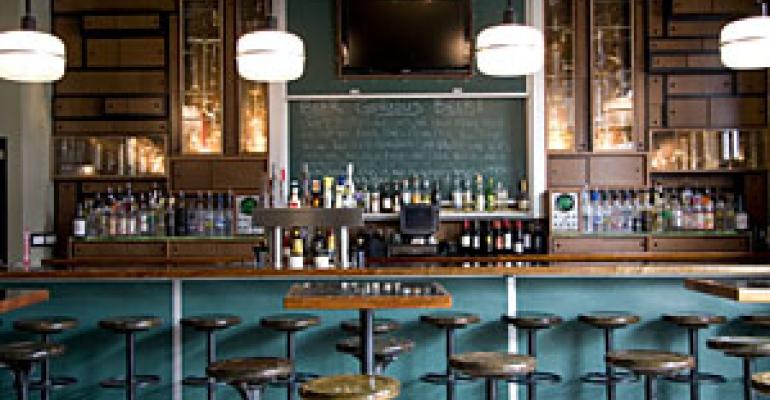Taking a cue from the locavore movement that favors food raised close to home, a growing number of restaurant operators are promoting local and regional wine, beers and spirits to their advantage.
Among the benefits of drinking local, according to proponents, are the quality and character of small-scale, artisan-made beverages, the positive message they send to customers and their potential to create local jobs.
One such proponent is Randy Zweiban, chef-owner of Province, an American restaurant in Chicago with an eco-friendly bent. At Zweiban’s bar, hand-crafted gin and vodka from suburban Chicago’s North Shore Distillery and Wisconsin’s Death’s Door Spirits and craft beers from Three Floyds Brewery in Indiana rub elbows with mainstream brands.
“We’re not giving up a thing by using these local products,” Zweiban said. “The quality is just amazing.”
Agood local beverage offering also tends to reflect well on an operator, say supporters of drinking local.
“People here are eager to support local businesses,” said Daniel Stern, lead bartender of Urban Farmer, a steakhouse in Portland, Ore., that has more than two dozen labels of gin, vodka, brandy, whiskey and absinthe made in Portland and environs. “Even customers who aren’t very familiar with spirits perk up when they hear a product is local.”
At Simone’s, a bar and grill on the South Side of Chicago, brews like Chicago’s Metropolitan Dynamo Copper Lager and Michigan’s New Holland Ichabod Ale are competitive in sales with well-established West Coast microbrews on the predominantly American, 10-tap, 30-bottle beer list, reported general manager Sam Short. In fact, one Midwest favorite has a cult following so fervent he likened it to “crack for beer lovers.”
What’s more, supporting local producers may create jobs in the community, reduce shipping-related carbon emissions and attract customers who prefer simple, natural fare to mass-produced goods, operators say.
“Anyone traveling to the Bay Area is aware of the sustainable and local foods movement here and the hard-core local beverage market developing as well,” said Frank Klein, co-owner of Fish & Farm restaurant in San Francisco and a restaurant consultant. “I think people here live and breathe it now.”
Although places like Portland and San Francisco boast the greatest number of local artisan beverage makers, the rest of the country is catching up. There are now 202 craft distilleries in 41 states, up from a handful a few years ago, according to the American Distilling Institute, or ADI, a trade association in Hayward, Calif. Craft distilling is following the path of the craft beer movement, which rose from modest numbers in the 1980s to more than 1,500 breweries in all 50 states today, the highest total in a century, according to the Brewers Association in Boulder, Colo.
With consumers becoming increasingly fussy about what they drink, a local selection can be an advantage.
“We have the magic that the big guys don’t,” said Bill Owens, president of ADI. “At a craft spirits tasting you can actually meet the maker of the product, not just a corporate salesperson.”
At Urban Farmer, the Drink Local Project capitalizes on that magic. It features the spirits of a different local craft distiller in a series of two-week promotions of original specialty cocktails. At press time, Portland’s Integrity Spirits was in the spotlight with creations like the Orchard Highball, made with its 12 Bridges Gin, house-made apple tonic and bitters, and Turner’s Fall, with its Lovejoy Vodka, cold-brewed coffee extract, cinnamon and cream. Such drinks “are great conversation starters at the bar” and hot sellers, Stern reported.
For an operator like Province’s Zweiban, the green aspect of drinking local is key. His exclusive beer offering, for reasons of sustainability as well as quality and style, is a rotating selection of three draft beers from Three Floyds Brewery in nearby Indiana. To avoid glass waste, he sells no bottled beer.
“Keeping the carbon footprint down on the things we serve, whether it’s food or beverages, is very important to us,” noted Zweiban.
At The Counter, a chain of build-your-own burger restaurants based in Culver City, Calif., a beer list with local flavor creates excitement and community feeling in each of its 23 locations.
The Counter in Reston, Va., sports Mid-Atlantic favorites like Maryland’s Hook & Ladder Golden Ale and Pennsylvania’s Yuengling beer along with well-known British and Belgian ales. At the chain’s Seattle location, brews like Maritime Pacific Old Seattle Lager and Hale’s Mongoose IPA play to home-state loyalty.
“We think localizing our stores makes sense,” said The Counter’s founder Jeff Weinstein. “We want them to be part of the neighborhood and the community.”

